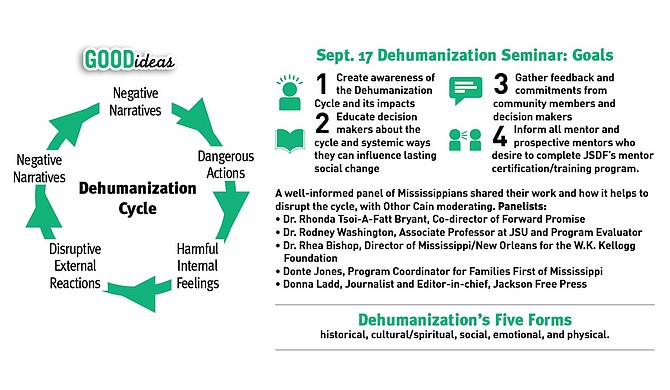Underprivileged. Underrepresented. Displaced. Inner City. People often use those trite words synonymously with people of color to define their experiences that result from institutionalized racism.
Unfortunately, onlookers, well-meaning or not, find it hard to delineate these experiences from who people of color really are: intelligent, strong, creative and resilient human spirit beings. These narratives give onlookers a license, in a sense, to interact or treat people of color delicately, extremely harsh or somewhere in between, depending on their environment and ideals.
This is dehumanization. It is a process by which an individual or group's full humanity is denied either through perceptions of an individual or group, or actual treatment.
Our children bear the biggest burden and the brunt of the dehumanization. They don't have the tools or knowledge to combat the impacts of dehumanization and racialized trauma.
They are not cognitively equipped to understand how the actions of others can negatively change their social and emotional wellness.
Adults are terribly affected as well; however, they can more easily learn to cope and address situations, positively or negatively, based on their environment and resources. An example is "Juxtaposition," a poem I wrote after watching a police officer shoot and kill Philando Castile in his car, as his child and girlfriend watched. It was my way of coping with the contrasting feelings of hope and hopelessness while raising a black son.
The dehumanization of people of color affects everyone.
Often the narratives about children of color begin and end with what Dr. Howard Stevenson and Dr. Rhonda Tsoi-A-Fatt Bryant call the "Cycle of Dehumanization." These researchers have eloquently strung together the thoughts, feelings, actions and conversations that people of color endure daily. The researchers support this concept with an evidence-based framework that can be used to create awareness; serve as a foundation for disrupting the cycle; and to create systemic change.
Our work at the Juanita Sims Doty Foundation (JSDF) focuses on disrupting the cycle of dehumanization by giving children of color the tools needed to find and use their voices to tell their own stories. We provide children with trained mentors who are capable of ensuring the mentoring relationship is culturally responsive, supportive, nurturing, honest, impactful and mutually beneficial.
In partnership with the Medgar and Myrlie Evers Institute, we have a leadership and character development mentoring program called the Ambassadors of the Evers Academy for African American Males (A-TEAAM). We also have the Empowering Scholars Through Engagement Education and Mentorship for girls in partnership with the Cleveland-Kirkland Foundation and Jackson State University's Department of Athletics. (www.jsdfoundation.com)
Our foundation, with the support of the 100 Black Men of Jackson and the Mississippi Community Education Center, took the first step toward a collective and inclusive approach to disrupting the Dehumanization Cycle with a seminar entitled "Reviving Humanization" on Sept. 17, 2019. Eighty-seven individuals represented the fields of mental health, hospital administration, education and news/media, in addition to funders, local school districts, charter schools and universities, a local private school, city officials and administrators, law enforcement, mentors, volunteers and other backgrounds.
Dr. Bryant, co-director of Forward Promise, a national program office of the Robert Wood Johnson Foundation, delivered the facts and impact of the "Dehumanization Cycle" so brilliantly that beyond her voice all that could be heard was the movement of pen to paper and a gasp here and there. She unpacked dehumanization and its five forms— historical, cultural/spiritual, social, emotional and physical.
She followed up with ways dehumanization affects the health and well-being for children of color and ways to disrupt it. Participants of the seminar said the seminar raised their awareness of the subtle ways dehumanization affects people of color.
"What's next?" they wanted to know.
This first step generated awareness and developed partners to help disrupt the cycle in Mississippi. We are working on the next step to galvanize more support and change agents who are serious about this work. It is vital to know that if we can positively affect the narrative, the other areas of the cycle will feel the impact as well.
Each time someone repeats, expounds on or acts upon a negative stereotype without providing a hopeful solution, they are perpetuating the negative narrative and therefore, dehumanizing others.
Don't dehumanize. Revive humanization. Everyone can play a part.



Comments
Use the comment form below to begin a discussion about this content.